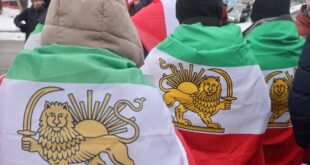DUBAI (AP) — A handful of US diplomats here on Iran’s doorstep have quietly reopened an Iran-focused diplomatic mission, the first such office since the US embassy in Tehran was taken over by radical students 27 years ago.
The low-key Iran Regional Presence Office, which sits inside the US consulate in Dubai, is coming to life at a time when Iran-US relations have plummeted to their lowest depths in years.
Iran’s disputed nuclear programme has pushed the two countries into sharp conflict. But in booming Dubai, home to hundreds of thousands of Iranians, the atmosphere is friendly. The United Arab Emirates, of which Dubai is one of seven city-states, maintains close ties with both Washington and Tehran.
Expatriate Iranians and Americans mingle freely here, especially those with business interests.
With Iran just 150 kilometres across the Persian Gulf, the US government has found a valuable spot to both watch Iran and reach out to its citizens.
“We don’t intend to reopen our embassy anytime soon,” said Undersecretary of State for Political Affairs Nicholas Burns, describing plans for the Iran office in March. “But we do plan to put more people, better trained, on the job of watching Iran.” The office is the first US diplomatic mission aimed at Iran since 1979, when revolutionaries seized control of the US embassy in Tehran and held 52 diplomats hostage for 444 days. The CIA, however, has long been believed to have people monitoring Iran from the Emirates.
The office was created as part of Secretary of State Condoleeza Rice’s push to boost scrutiny of Iran inside the State Department, which includes rebuilding the once-shuttered Iran desk and training more staff in Farsi.
Congress recently approved an $85 million Iran initiative, which mostly increases the duration of State Department broadcasts into Iran by Radio Farda and Voice of America.
Burns said $5 million would also be earmarked for Iranians to study at US universities.
The half-dozen US diplomats at the Iran regional office here appear to focus on the softer side of relations, leaving the nuclear confrontation to Washington. Several US officials here declined to be interviewed about the Iran office, saying Washington seeks a low profile.
But one US diplomat, speaking on condition of anonymity because he lacked clearance to speak publicly, said the Iran office seeks to arrange scholarly conferences and recruit Iranians to study or teach in the United States.
“We want to separate out issues like support for terrorism and weapons of mass destruction, and focus on our relations with the people and the nation and its history and culture,” the US diplomat said.
The American official declined to comment on US intelligence activities in Dubai. But Dubai is widely described as a key focus of Iranian intelligence, which keep a close eye on — and may even take part in — Iranian business.
Abbas Bolurfrushan, president of the Iranian Business Council in Dubai, said he has met with members of the new US Iran team, including director Jillian Burns, a career diplomat and state department expert on Iran.
“Since they don’t have an office in Iran, it’s valuable for them to have an office here to gather information on Iran,” Bolurfrushan said.
US diplomats don’t openly attend Iranian Business Council meetings, but the Iranian business group has friendly relations with the American Business Council in Dubai, Bolurfrushan said.
Washington’s interest in Dubai stems in part from the wealthy community of as many as 500,000 Iranians living in the United Arab Emirates, mainly Dubai. Iranians have invested billions of dollars here, much of that in businesses with close ties with Tehran.
US officials have tried to use those ties in more direct ways, also.
The US recently handed the Emirates’ government a list of Iranian firms it branded as government “front companies” allegedly bent on acquiring weapons and dual-use technology blocked by the US trade embargo.
“We hope that our friends here in the UAE or elsewhere are watching those [firms] very closely,” US Deputy Treasury Secretary Robert Kimmitt said in a September interview in Abu Dhabi.
“Iranians will go to great lengths to disguise the nature of the transactions involved,” he said.
Dubai is also home to US government efforts to influence opinion in the region, mainly through the Arab-language press clustered here — an important issue not just for anti-terror efforts but also to explain to the Arab world the US position on Iran.
A year ago, the US Central Command based a team in Dubai to give interviews on US military policy to Arab TV networks. This summer, the State Department followed suit, putting Arabic-speaking diplomat Michael Pelletier here to lead efforts to explain American views.
The Emirates maintains strong commercial ties to Iran even while harbouring close military and intelligence relations with the United States — including hosting US Air Force spy planes and air refuellers.
The Iranian government has expressed some unhappiness with Dubai’s role, Bolurfrushan said — although most of that concerns economic issues.
Tehran officials have, for example, called for new policies aimed at halting the exodus of skilled Iranian professionals to Dubai.
 Eurasia Press & News
Eurasia Press & News



